
A wild card in card games is one that may be used to represent any other playing card, sometimes with certain restrictions. Jokers are often used as wild cards, but other cards may be designated as wild by the rules or by agreement. In addition to their use in card games played with a standard pack, wild cards may also exist in dedicated deck card games, such as the 'Master' card in Lexicon.

A trick-taking game is a card- or tile-based game in which play of a hand centers on a series of finite rounds or units of play, called tricks, which are each evaluated to determine a winner or taker of that trick. The object of such games then may be closely tied to the number of tricks taken, as in plain-trick games such as contract bridge, whist, and spades, or to the value of the cards contained in taken tricks, as in point-trick games such as pinochle, the tarot family, briscola, and most evasion games like hearts.
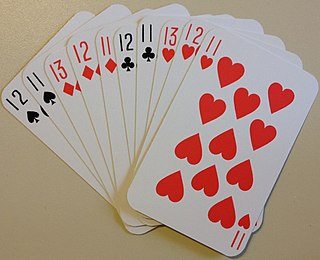
500 or Five Hundred is a trick-taking game developed in the United States from Euchre. Euchre was extended to a 10 card game with bidding and a Misère contract similar to Russian Preference, producing a cutthroat three-player game like Preference and a four-player game played in partnerships like Whist which is the most popular modern form, although with special packs it can be played by up to six players.

Bezique or bésigue is a 19th-century French melding and trick-taking card game for two players, which was imported to Britain and is still played today. The game is derived from piquet, possibly via marriage (sixty-six) and briscan, with additional scoring features, notably the peculiar liaison of the Q♠ and J♦ that is also a feature of pinochle, Binokel, and similarly named games that vary by country.

Skat, historically Scat, is a three-player trick-taking card game of the ace–ten family, devised around 1810 in Altenburg in the Duchy of Saxe-Gotha-Altenburg. It is the national game of Germany and, along with Doppelkopf, it is the most popular card game in Germany and Silesia and one of the most popular in the rest of Poland. A variant of 19th-century Skat was once popular in the US. John McLeod considers it one of the best and most interesting card games for three players, and Kelbet described it as "the king of German card games." The German Skat Association assess that it is played by around 25 million Germans – more than play football.

Spades is a trick-taking card game devised in the United States in the 1930s. It can be played as either a partnership or solo/"cutthroat" game. The object is to take the number of tricks that were bid before play of the hand began. Spades is a descendant of the whist family of card games, which also includes bridge, hearts, and oh hell. Its major difference as compared to other whist variants is that, instead of trump being decided by the highest bidder or at random, the spade suit always trumps, hence the name.
High card by suit and low card by suit refer to assigning relative values to playing cards of equal rank based on their suit. When suit ranking is applied, the most common conventions from lowest to highest are:
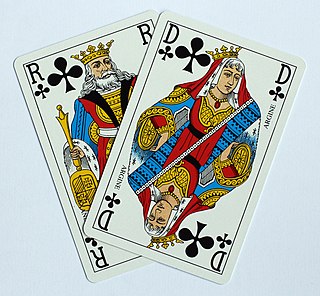
Belote is a 32-card, trick-taking, ace–ten game played primarily in France and certain European countries, namely Armenia, Belgium, Bulgaria, Croatia, Cyprus, Georgia, Greece, Luxembourg, Moldova, North Macedonia, Bosnia and Herzegovina and also in Saudi Arabia and Tunisia. It is one of the most popular card games in those countries, and the national card game of France, both casually and in gambling. It appeared around 1900 in France, and is a close relative of both Klaberjass and klaverjas. Closely related games are played throughout the world. Definitive rules of the game were first published in French in 1921.

Sheng ji is a family of point-based, trick-taking card games played in China and in Chinese immigrant communities. They have a dynamic trump, i.e., which cards are trump changes every round. As these games are played over a wide area with no standardization, rules vary widely from region to region.

Doppelkopf, sometimes abbreviated to Doko, is a trick-taking card game for four players.
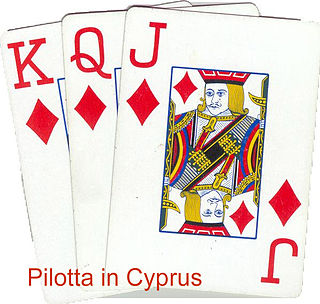
Pilotta (in Greek Πιλόττα) is a trick-taking 32-card game derived from Belote. It is played primarily in Cyprus, being very popular among the Cypriot population, especially the youngsters, who usually arrange “pilotta meetings” in places such as cafés and cafeterias. Its counterpart played in Greece is named Vida.
Two-ten-jack is a Japanese trick-taking card game for two players that takes its name from the three highest-scoring cards in the game: the 2, 10 and Jack in three different suits.

Konter a Matt, Kontra a Matt or Konter a Midd is a Luxembourgish trick-taking card game played by four players. The game is popular enough to have been televised on RTL, Luxembourg's leading TV station and for tournaments to be organised. Konter a Matt is one of a family of similar games, known as the Couillon Group, played in the Benelux area. Other games in the family include the Belgian game of Couillon, known as Kwajongen in Flemish areas and Kujong in Luxembourg, the Dutch game of Troeven and the Belgian games of Brûte and Gamelle.

Bauernheinrich is a card game for four players that is played in the region of Anglia in the north German state of Schleswig-Holstein. It is played with a normal Skat pack. The winner is the one to 'go out' first. An unusual feature of this game is that each player has their own trump suit and so can trump others with it; a feature shared with the Czech game, Dudák, and the Russian game, Svoi Kozyri. It is a member of the 'beating game' family.
Maw, formerly also mawe, was a Scottish card game for two players, popularised by James I, which is ancestral to the Irish national game of Twenty-five as well as the Canadian game of Forty-fives. Maw appears to be the same as five cards, a game described by Charles Cotton in the 17th century. The game disappeared from the literature after the period of the English Commonwealth, only to emerge in Ireland in the 19th century in new forms for two or more players and known as five and ten, spoil five and forty-five. These new variants are still played today, the latter has evolved into the Canadian game of forty-fives.
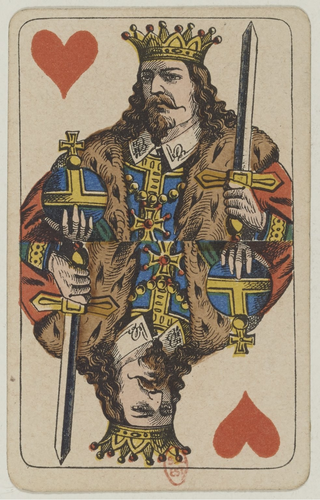
Brus is a four-hand card game of German descent that was once played in Denmark and Estonia. The game is descended from the oldest known card game in Europe, Karnöffel, a fact testified by its unusual card ranking and lack of a uniform trump suit.
Piquesept is an extinct German card game of the ace–ten family that is recorded from 1798 to 1840. It had the unusual features that the player with the Seven of Spades played it out immediately, automatically collecting the highest card from each defender and then did not have to follow suit, unlike the other players.
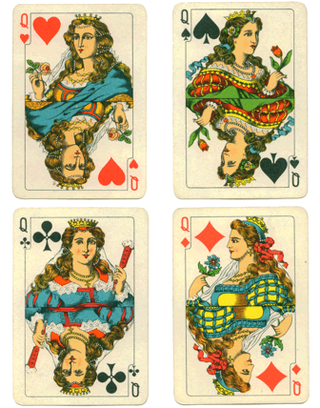
Baśka is a fast-moving, Polish card game for four players played using traditional French-suited playing cards. It uses a shortened pack of just 16 cards and is similar to kop which is also played in Poland. Both are derived from German Schafkopf.
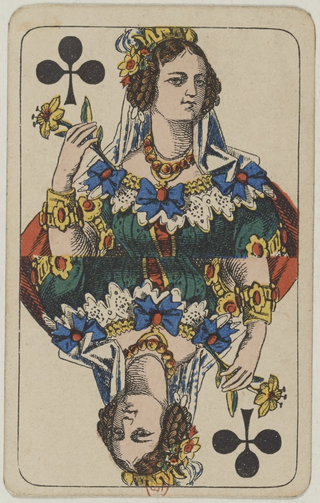
Skærvindsel is a Danish card game for four players that is a member of the Schafkopf family. Today it is mostly played in Jutland and is therefore often spelled Sjervinsel, but was previously widespread throughout Denmark. It was the first Danish game where the winner of the auction, the declarer, could choose a partner by calling an Ace. This principle has since been transferred to Call-Ace Whist (Esmakkerwhist).

Sjavs is a Danish card game of the Schafkopf family that is played in two main variants. In Denmark, it is a 3-player game, played with a shortened pack of 20 cards; in the Faroe Islands, where it is very popular, it is a four-hand, partnership game using a standard piquet pack of 32 cards.















